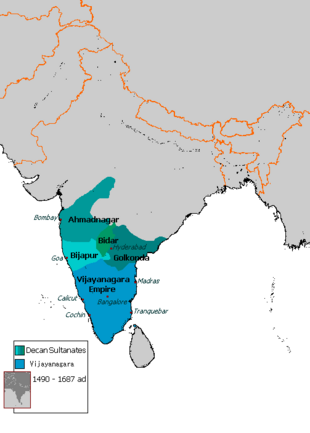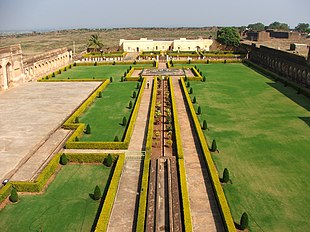Bidar (Sultanate)
| Bidar | |||||
| 1489-1619 | |||||
|
|||||
| Capital | Bidar | ||||
| Form of government | sultanate | ||||
| founding | 1489 | ||||
| resolution | 1619 | ||||
| State religion: Islam. Dynasty: Barid Shahi |
|||||
| Location of the Sultanate of Bidar 1489–1619 | |||||
| Burial place of the Sultans of Bidar | |||||
| Bidar Fortress | |||||
The Sultanate of Bidar was one of the five Central Indian Deccan sultanates that emerged from the Bahmani Sultanate . It was founded in 1492 and lasted until the submission by the Sultanate of Bijapur in 1619 . It is named after the capital Bidar in what is now the Indian state of Karnataka .
history
The city of Bidar had been the capital of the Bahmani Sultanate since the 1420s. Qasim Barid Shah overthrew the Bahmani Sultan Mahmud Shah IV in 1492 and thus established the Barid Shahi dynasty . Nominally, the Bahmanids continued to rule, but the Barid Shahi only used them as a pretext for rule and pressure against the other Dekkan sultanates that had emerged from the Bahmani Empire. In 1527 the nominal rule of the Bahmanids also ended. As a result, Bidar lost a large part of its territory to the neighboring states. In 1565 it participated in the alliance with Bijapur, Golkonda and Ahmadnagar in the battle of Talikota against the south Indian Hindu empire Vijayanagar , which suffered a crushing defeat. Bidar's independence ended in 1619 with the conquest by Bijapur.


